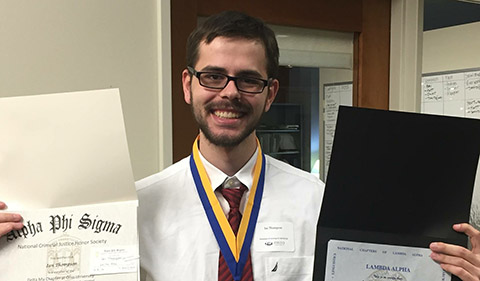
Ian Thompson after the Department of Sociology and Anthropology Awards Ceremony, April 2016.
Ian Thompson ’16 graduated Cum Laude with a B.A. in Sociology-Criminology and a minor in Anthropology from the College of Arts and Sciences at Ohio University.
“I had no idea what I wanted to do once I left college,” he says. “My main goal, I suppose, was to land an internship with the FBI. But that did not work out.”
Path to Employment
After he spent the summer as a volunteer with the Department of Corrections and Rehabilitation in Columbus as a recidivism researcher, Thompson decided that he wanted to work for the state.
Immediately after graduating from college he had applied for a number of criminal justice and corrections jobs in Ohio, but none worked out.
That’s when he started spreading his search out to social work departments like the Bureau of Workers’ Compensation.
After several months of not hearing anything, he finally got an email from the Department of Disability Determination Services (a Division of the Social Security Administration) saying they were interested in Thompson’s application.
The position with the department was as a Claims Adjudicator, and there were a couple of steps to go through.
It started with a civil service exam to test his knowledge in several areas, one of which was medical information. Taking these tests reminded him of taking the timed online exams on Blackboard! The test was challenging, but he passed and moved on to the interview, which was fairly standard although with a panel of department supervisors.
“A couple of the questions focused on what I would do in certain situations – and why I felt like I was a good fit for this job,” he says.
Hired!
After several weeks of waiting for a phone call he received an email telling him he had been accepted for the position.
Thompson’s official title is “Disability Claims Adjudicator.”
His job is to review medical evidence and information provided by applicants seeking social security disability benefits. He says this is similar to Worker’s Comp in that applicants apply for money, claiming inability to continue working due to a medically determinable impairment, be it physical or mental in nature.
He spends time looking through documents provided by various medical professionals that have treated clients, ranging from hospitals, chiropractors, or psychiatrists. His task is to evaluate if the claimant’s illness meets the criteria to qualify him or her as disabled or if perhaps the claimant still has the capacity to return to past work or other work.
The Job he Always Wanted?
He acknowledges that this is not the job he expected post-graduation.
“But I love it!” he exclaims, “I love the people I work with I like how the work I do actually have some impact in peoples lives. And I love that even though I am out of college I am still learning a lot, especially in terms of medical knowledge. I do sometimes wish I had gone in and listen to a few osteology lectures.”
Missing OHIO
He does miss “the awesome world” of Ohio University and Athens, from “the professors who taught me everything I know,” to the chicken and waffle sandwiches from the uptown Grill and the mocha lattes from Donkey Coffee.
Advice for students
Thompson has advice for current students:
1. Work hard and study hard for your classes and never skip them.
2. Make sure to take good notes and study at least two days in advance for tests.
3. Go to professors when you have questions or you don’t understand the material they are there to help
4. HAVE FUN. Don’t spend the entirety of your time studying and working. Take some time every evening to just go out with friends and live it up…within reason.
About to Graduate?
And for those preparing to graduate, he says:
1. Send out at least five job applications each day, if you don’t hear anything back right away don’t worry about it sometimes it takes a while for them to respond.
2. Keep your resume down to just one page and to the point, but build yourself up to be the kind of worker that will attract an employer’s eye right away.
3. Widen your job search to other fields, you never know what you’ll find and you just might find a job that you never thought you would want, but turns out to be the best fit for you.
4. When going in for a job interview, dress for success and be calm and relaxed, don’t be stiff or nervous. It helps to practice interviews with friends and family.
5. Save your money and start budgeting and be sure to separate out the needs from the wants.
And Thompson’s encouragement for all: “GO BOBCATS!”



















Comments